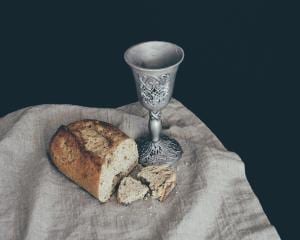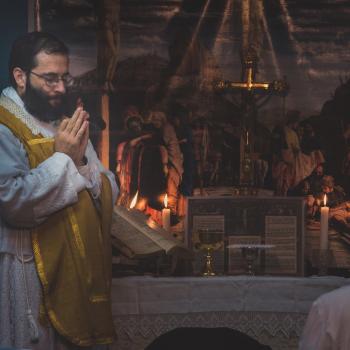
This weekend, Joe Biden was denied Communion in a parish in South Carolina. Although denying Communion is a rare occurrence, denying Communion is sometimes necessary if the person blatantly promotes something, like legal abortion, gravely contrary to Catholic teaching. I want to cite several people who gave excellent explanations about why this is so. In case, you missed it, here’s the news about Joe Biden being denied Communion.
Fr. Matthew Schneider, LC (Myself)
I posted on Twitter the distinction between canon 916 and 915. 916 instructs people to not present themselves if not in the state of grace, while 915 is about those who have made public actions and statements gravely contrary to Church teaching and have not publicly changed. In such a case it is the duty of the priest to deny Communion.
Denying Communion is not a judgment of the person’s soul.
Canon 916 deals with people’s souls & suggests those with mortal sin on their conscience refrain from Communion on their own accord.
Canon 915 on refusing Communion deals with “obstinately persist in MANIFEST grave sin.” https://t.co/R48ZMpGlOz
— �Fr. Matthew Schneider, LC� (@FrMatthewLC) October 29, 2019
Denying Communion due to Canon 915 is a public act (as opposed to 916 which is privately not attempting to receive Communion) & should be based on public facts.
If Biden is repentant, it should be relatively easy to see: how does he respond when asked about abortion’s legality?
— �Fr. Matthew Schneider, LC� (@FrMatthewLC) October 29, 2019
Fr Ryan Hilderbrand
Fr Ryan is a diocesan priest in Indiana. He wrote an extensive thread on the pastoral realities of having to deny Communion. (Asit is a long thread, I’m just going to quote from ThreadReader rather than embed each tweet.)
DENYING SOMEONE HOLY COMMUNION – A PRIMER
Lots of opinions about former VP Biden (who I will call “Mr. Biden” per US custom) being denied Holy Communion. Most of the opinions are uninformed garbage. Here’s a quick overview re: when / how someone is denied Holy Communion.–I’ll keep technical lingo to a minimum.All baptized Catholics, by default, have a right to the sacraments that they can receive. Sometimes, your life prevents you from receiving a sacrament.
e.g., I do not have a right to the sacrament of Matrimony b/c I’m celibate. 1/–Someone may not have a right to Penance and Holy Communion because they are living a life that permanently alienates them from the Church.However, if they approach for one of these sacraments, they can be denied if and only if they are “manifest grave sinners.” 2/–Suspicion of “grave sin” i.e., mortal sin, is NOT sufficient cause to deny someone the sacrament. I can’t deny Joey Joe Joe Shabadoo the Eucharist because I THINK he is in grave sin. I don’t have access to that kind of knowledge. 3/–Grave sin must be MANIFEST – that is, public and enduring over time – before I can deny someone Holy Communion.This is where Mr. Biden comes in. Voting to protect abortion “rights” is clearly grave matter for sin. That he voted like this multiple times is much, much worse. 4/–By his actions, he leads us to believe that he has willingly placed himself outside the communion of the Church. Therefore, so that he does not “eat and drink unto his own condemnation,” it is an act of mercy to deny Mr. Biden Holy Communion. 5/–If he wishes to be readmitted to Holy Communion – wonderful! He needs to do two things:1. Make a good confession.
2. Publicly renounce his prior public support for abortion.A public crime (not sin, but crime) must be repaired in public. 6/
–
As a closer, no priest worth his salt EVER relishes the thought of denying someone a sacrament. It breaks our hearts and we lose sleep over it. An old priest told me that he only denied someone absolution once in his life.
“I still cry about it from time to time,” he admitted.–Related – pay attention to what the priest in SC said about the situation with Mr. Biden. He is quoted, “SADLY …” The guy is tore up about denying Mr. Biden Holy Communion, as any priest ought to be.
You can read his whole thread unrolled.
Deacon Steven Greydanus
Deacon Steven is well-known for his Catholic movie reviews, but he evidently knows canon law. Joe Biden’s bishop stated in 2008:
“I look forward to the opportunity to enter into a dialogue on a number of issues with Sen. Biden and other Catholic leaders in the Diocese of Wilmington,” the bishop said in an interview that was published four days before he was installed as bishop of Wilmington. “However, I do not intend to get drawn into partisan politics nor do I intend to politicize the Eucharist as a way of communicating Catholic Church teachings. It is critical to keep the lines of communication open if the church is going to make her teachings understood and, please God, accepted. It is my belief that Catholics of all occupations have the same duty to examine their own consciences before determining their worthiness for the reception of communion. I think I will get a lot more mileage out of a conversation trying to change the mind and heart than I would out of a public confrontation.”
To which the Deacon responded:
It is worth adding that the Church is not politicizing the Eucharist: the politicians who go gravely contrary to CHurch teaching they try to receive are the ones politicizing it. Canon 916 instructs them not to go up for Communion but they decide to act otherwise.
Conclusion
It is sad when people put themselves outside the Church despite protestations to the contrary. Communion is Jesus himself and also represents union with Catholic teaching and practice. In many cases, canon 916 asks us to refrain from Communion. If someone who has a well-known public stance or behavior contrary to Church teaching, canon 915 offers a backup if they will not refrain from Communion themselves. It is not about the state of their soul, but about what is known publicly by the majority of the congregation about them. It is directly involved with avoiding scandal. It generally prevents sacrilege as well but that is not its main point. Even if the person converted and went to confession 5 minutes before Mass, eliminating sacrilege, the scandal remains until they publicly indicate a change.
Note: please support me one-time via Acceptiva or monthly via Patreon.












